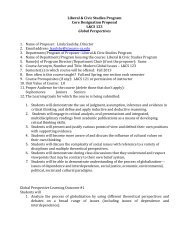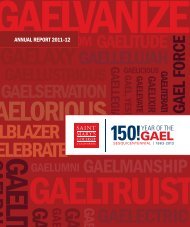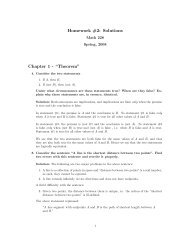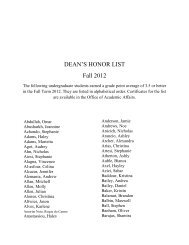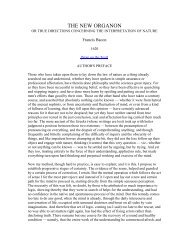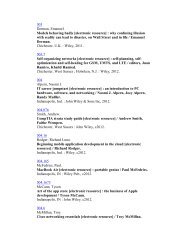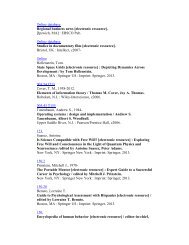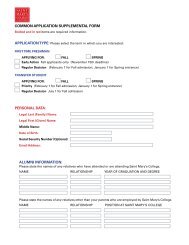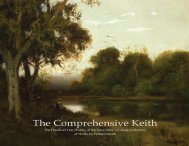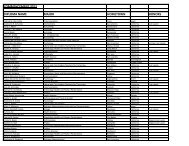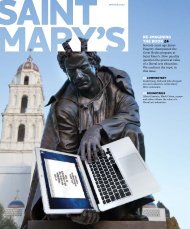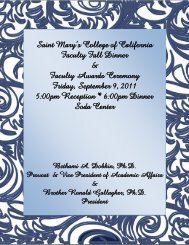2008-09 Catalog - Saint Mary's College of California
2008-09 Catalog - Saint Mary's College of California
2008-09 Catalog - Saint Mary's College of California
You also want an ePaper? Increase the reach of your titles
YUMPU automatically turns print PDFs into web optimized ePapers that Google loves.
Anthropology CurriculumAnthropologyAt the intersection <strong>of</strong> biological science, humanities and social science, anthropology brings a social, cross-cultural,historical, and multi-ethnic dimension to the liberal arts curriculum. Anthropology provides students with a theoreticaland analytical framework with which to function in an increasingly global, complex and interdependent world.Fundamental to anthropology is the experience <strong>of</strong> conducting field work. Living with and studying in cultures around theworld, anthropologists seek to discover universals as well as document differences among human groups. Departmentfaculty members have done field work in Italy, Polynesia, Ecuador, Peru, Bolivia, Guatemala, China, the Philippines, andthe United States.Anthropology’s subject matter ranges from pre-history to the study <strong>of</strong> contemporary cultures in the United States and throughoutthe world. Our faculty’s expertise includes household archaeology, maritime archaeology, indigenous rights, museumstudies, urbanization, gender, globalization, religion, virtual societies, identity, immigration, colonialism and post-colonialsociety. Because it teaches us about other people’s lives, traditions and values, anthropology prepares us to understand andappreciate our own multicultural society.American anthropology comprises four sub-disciplines: cultural anthropology, archaeology; physical anthropology andlinguistics. Our program emphasizes the holistic attributes <strong>of</strong> traditional anthropology as well as a commitment to theapplication <strong>of</strong> anthropological insights to contemporary social issues such as human rights, cultural resource management,and political and economic injustices.The cross-cultural nature <strong>of</strong> the anthropology major develops research and analytical skills well-suited to students interestedin careers in both international and domestic business, teaching at all levels, public and mental health, counseling,social work, international non-pr<strong>of</strong>it agencies, law and law enforcement, museum curatorship, and archaeological andanthropological research.Students can take advantage <strong>of</strong> the exchange course program to enroll in anthropology and archaeology courses atthe University <strong>of</strong> <strong>California</strong>, Berkeley, as well as Mills <strong>College</strong> and <strong>California</strong> State University East Bay at Hayward. Thedepartment <strong>of</strong>fers a field placement/internship program with neighboring institutions such as social service agencies andbusinesses. Students are encouraged to study a foreign language and to study abroad. The chair can advise students onsuggested programs.FacultyPaola Sensi-Isolani, Ph.D., Pr<strong>of</strong>essor, ChairCynthia Van Gilder, Ph.D., Associate Pr<strong>of</strong>essorJames Allan, Ph.D., LecturerDana Herrera, Ph.D., Assistant Pr<strong>of</strong>essorJennifer Heung, Ph.D., Assistant Pr<strong>of</strong>essorLynn M. Meisch, Ph.D., Pr<strong>of</strong>essorLearning OutcomesWhen students have completed the anthropology program they will be able to:• Appreciate the great diversity <strong>of</strong> human cultures and the interrelatedness<strong>of</strong> economic, socio-political and religious systems.• Approach cultural diversity with thoughtfulness and sensitivity.• Examine their own lives in social and cultural context and assesshow their lives are affected by the specific time and place in whichthey live.• Understand anthropological theory and methods and howthey are applicable in and beyond academia.• Employ critical reading, thinking, and writing skills that will allowthem to understand and meaningfully contribute to an increasinglycomplex, multicultural, and interdependent world.• Express themselves with confidence and clarity in both writtenand oral communication.• Work independently collecting and analyzing primaryand secondary data, producing research papers in accordancewith the ethical and pr<strong>of</strong>essional standards <strong>of</strong> the AmericanAnthropological Association.51



